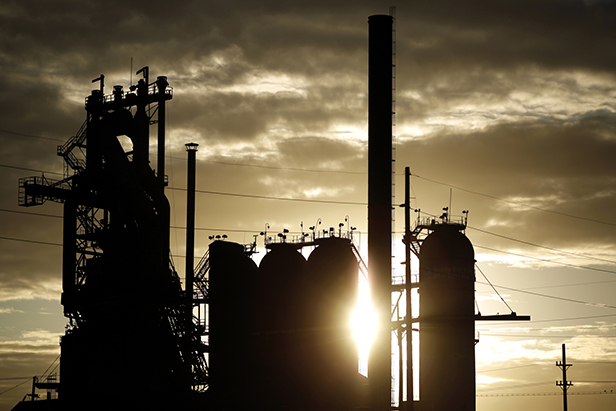 The silhouette of idle blast
furnaces are seen during sunrise at the U.S. Steel Corp. Granite
City Works facility in Granite City, Illinois, U.S., on Wednesday,
Oct. 25, 2017. U.S. Steel Corp. is scheduled to release earnings
figures on October 31. Photographer: Luke
Sharrett/Bloomberg
The silhouette of idle blast
furnaces are seen during sunrise at the U.S. Steel Corp. Granite
City Works facility in Granite City, Illinois, U.S., on Wednesday,
Oct. 25, 2017. U.S. Steel Corp. is scheduled to release earnings
figures on October 31. Photographer: Luke
Sharrett/BloombergFears at the Border
In Clinton County, New York, a decision 25 years ago to tie its
future to its proximity to Montreal paid off. About 15 percent of
its population of 80,000 works for a Canadian or border-related
employer, according to Garry Douglas, CEO of the North Country
Chamber of Commerce in Plattsburgh. Direct annual economic impact
from cross-border commerce amounts to more than $2 billion a year.
Tariffs threaten that.“Most are hopeful this is all tactical and
will eventually be resolved,” Douglas said. “The uncertainty,
however, is already having a chilling effect on decisions by
companies regarding cross-border investment and deals.”Similar
fears loom in Florida, bound to Latin America and the Panama Canal
with 14 deep-water seaports. The Florida Chamber of Commerce
estimates that a quarter of the state's economy depends on trade to
some extent. But in Granite City, Illinois,
the sound of blast furnaces roaring back to life is the area's
hope. U.S. Steel Corp. plans to hire about 300 people to restart a
second furnace at its plant there to satisfy fresh demand for
American-made steel, the company said this month. It resumed
operations in March after Trump announced the tariffs based on
national-security grounds.The town of about 30,000, just across the
Mississippi River from St. Louis, was founded around the steel
industry, said James Amos, its economic development director. More
workers at U.S. Steel mean more people buying gas or grabbing
lunch. “It really does put a real smile on people's faces,” Amos
said.Elsewhere in America's industrial heartland, though, companies
are on edge. Many have built supply chains that source parts from
all over the world.“Uncertainty in terms of trade and global flows
like that isn't good,” said Blake Moret, chairman and chief
executive of Rockwell Automation Inc., a Milwaukee producer of
industrial systems.Some companies are delaying capital projects.
Tariffs are clouding investment decisions and raising construction
costs, said A.B. Ghosh, North America president of Akzo Nobel NV's
specialty chemical business. While the Dutch company will proceed
with a $100 million upgrade of an Illinois plant, “it may stop us
from doing other investments,” Ghosh said.
But in Granite City, Illinois,
the sound of blast furnaces roaring back to life is the area's
hope. U.S. Steel Corp. plans to hire about 300 people to restart a
second furnace at its plant there to satisfy fresh demand for
American-made steel, the company said this month. It resumed
operations in March after Trump announced the tariffs based on
national-security grounds.The town of about 30,000, just across the
Mississippi River from St. Louis, was founded around the steel
industry, said James Amos, its economic development director. More
workers at U.S. Steel mean more people buying gas or grabbing
lunch. “It really does put a real smile on people's faces,” Amos
said.Elsewhere in America's industrial heartland, though, companies
are on edge. Many have built supply chains that source parts from
all over the world.“Uncertainty in terms of trade and global flows
like that isn't good,” said Blake Moret, chairman and chief
executive of Rockwell Automation Inc., a Milwaukee producer of
industrial systems.Some companies are delaying capital projects.
Tariffs are clouding investment decisions and raising construction
costs, said A.B. Ghosh, North America president of Akzo Nobel NV's
specialty chemical business. While the Dutch company will proceed
with a $100 million upgrade of an Illinois plant, “it may stop us
from doing other investments,” Ghosh said.
Transportation of Goods at Risk
Companies with links to Mexico are particularly worried. Mexico has been hit with steel tariffs, and Trump has threatened to pull out of the North American Free Trade Agreement (NAFTA).Union Pacific Corp. has connections at six border crossings, and 12 percent of its volume originates or ends in Mexico. The Omaha, Nebraska-based railroad also owns a 26 percent stake in the Mexican railroad Ferromex.“The worst fear would be the trade war in general,” said Rob Knight, CFO of Union Pacific. “Does Mexico come up with some other retaliatory action?”Growers of apples, pears, and cherries in Washington, Oregon, and Idaho are rushing to figure out what they can do with perishable fruit that's now the target of retaliatory tariffs in markets such as China, India, and Mexico. Mark Powers, president of the Northwest Horticultural Council, said its 4,700 growers in those states export about $1 billion worth of produce each year. Finding new, tariff-free markets requires lengthy negotiations between countries."Quantifying the results of this is a guessing game," he said. "We're already seeing customers coming back and asking for discounts and offsets."Cherries are a pressing concern, particularly because members are enjoying a bountiful crop. The fruit lasts only about seven days once picked, and most exports are shipped in planes to Asia."If China closes, that's our largest cherry market, and it's hard to divert on the fly," Powers said.
Complete your profile to continue reading and get FREE access to Treasury & Risk, part of your ALM digital membership.
Your access to unlimited Treasury & Risk content isn’t changing.
Once you are an ALM digital member, you’ll receive:
- Critical Treasury & Risk information including in-depth analysis of treasury and finance best practices, case studies with corporate innovators, informative newsletters, educational webcasts and videos, and resources from industry leaders.
- Exclusive discounts on ALM and Treasury & Risk events.
- Access to other award-winning ALM websites including PropertyCasualty360.com and Law.com.
*May exclude premium content
Already have an account? Sign In
© 2024 ALM Global, LLC, All Rights Reserved. Request academic re-use from www.copyright.com. All other uses, submit a request to [email protected]. For more information visit Asset & Logo Licensing.







